Rinus Michels: The Most Influential Manager There Ever Was & His Total Football Legacy
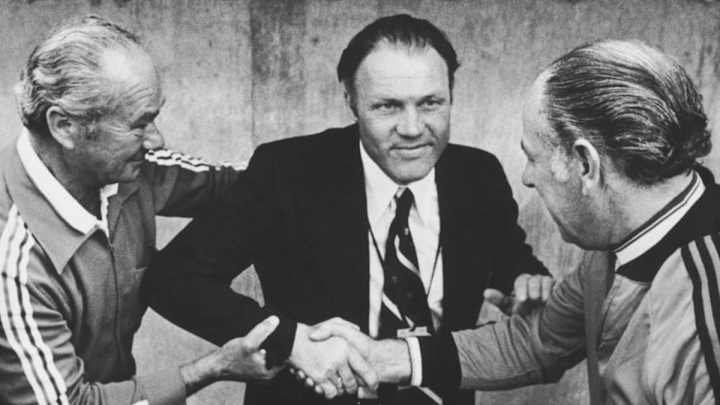
Rinus Michels is number 3 in 90min's Top 50 Great Managers of All Time series. Follow the rest of the series over the course of the next week.
As language continues to mutate with the times, words like 'influence' become tarnished, used to describe any old John/Jane Doe with a few thousand Instagram/Twitter followers. The fact that these can quite easily be bought and manipulated only serves to further degrade the term.
So, when I say Rinus Michels is the most influential football manager that has walked this earth, I don't mean it as a measure of the number of hits he was able to procure for a protein shake brand, or an energy drink, or some makeup wipes.
I mean it in a 'he literally changed the style, aesthetics and mechanics of the biggest sport in the world' kind of way. Because he did. That's verified. He birthed modern football, and he gave it an even better name: 'Totaalvoetbal' or, as we have come to know it, 'Total Football'.
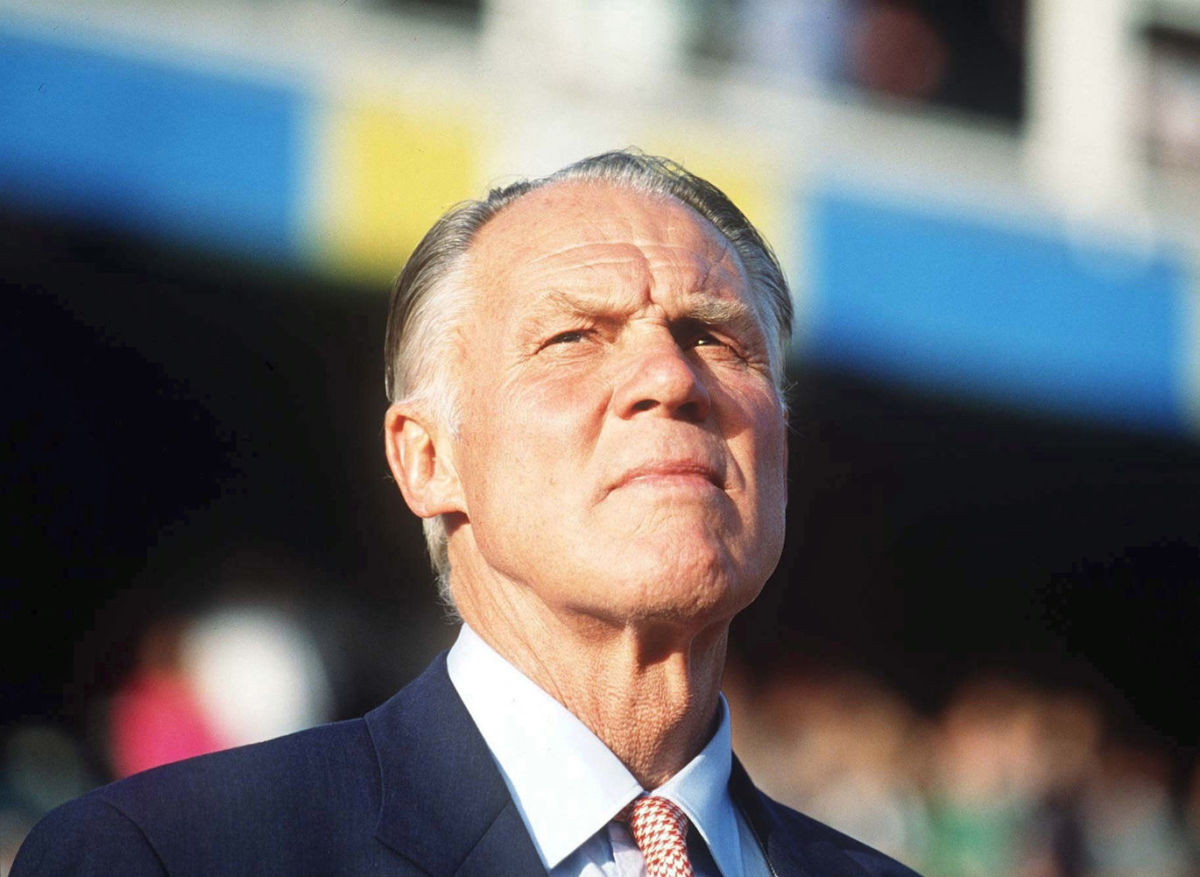
Born in Amsterdam in February 1928, he joined his local side's youth setup at the age of 12 and, after the small matter of World War II held up his transition to the senior squad, made his debut for the first team in 1946.
That local club was, of course, Ajax Amsterdam, a team Michels would represent 264 times and score 122 goals for, and in fact the only team he would ever play for.
In 1958 - just as Hungary's 'Magical Magyars' were fading from view - Michels hung up his boots, put on a suit, and set to work on becoming a manager.
“Football is something like war. Whoever behaves too properly is lost.” - Rinus Michels
The 'Magyars' are important, because they tie in with that oh-so-evocative of terms, 'Total Football'.
You see, while Michels provoked the coining of the term and shaped the style we still love today, he did not pioneer it. Both the Austrians and the Hungarians had done that long before him, and long before their occupation of the Netherlands during World War II, too.
Clubs Managed
JOS | 1960-64 |
|---|---|
DWS | 1964-65 |
Ajax | 1965-71 & 1975-76 |
Barcelona | 1971-75 & 1976-78 |
Netherlands | 1974, 1984-85, 1986-88 & 1990-92 |
LA Aztecs | 1979-80 |
FC Koln | 1980-83 |
Bayer Leverkusen | 1988-89 |
Hell, he wasn't even the first man to bring it to the Dutch capital. In a segment we shall entitle 'Brexit Corner' *Rule Britannia plays sorrowfully in the background*, it is true that both Jack Reynolds - who had coached Michels - and Vic Buckingham of little old Blighty had instilled these methods years before Rinus took the job.
In any case, the principle of inverting forwards or dropping midfielders to fill in on the flanks wasn't necessarily a new phenomenon, either.
Johan Cruyff and Rinus Michels walking around Highbury. Even by that ground's rich history that is some pairing. pic.twitter.com/45ep8gzcsB
— Just Another Gooner (@N5_1BU) March 24, 2016
So, Michels wasn't a pioneer. But he was a fanatic in a way his predecessors weren't, and it was he - with the kind of cruelty that the likes of Pep Guardiola have since adopted - that realised in order to fully to exploit the merits of this free-flowing, shape-shifting style, work needed to be done.
And it needed to be done all the time. Fitness was paramount.
What he also understood was that this wasn't just a way to bolster attacks and overload opposition defences. To truly dominate the opposition, the shape-shifting fluidity had to work both ways. Yes, defenders had to be able to fill in in the middle, and vice-versa, but forwards had to plug holes too. And, while expansiveness - the utilisation of all available space - was the name of the game going forward, the opposite was true at the back. Compactness was the key.
"It is an art in itself to compose a starting team, finding the balance between creative players and those with destructive powers, and between defence, construction and attack – never forgetting the quality of the opposition and the specific pressures of each match." - Rinus Michels
It is in these principles that you see the all-encompassing influence Michels had. Not only did his eccentric position-swapping and obsessive philosophy shape the minds of Marcelo Bielsa and Guardiola - who carried the legacy of 'Total Football' to new heights with the golden generation at Barcelona - it also indelibly impacted such defensive masters as Jose Mourinho and Rafa Benitez, even if both would go for the low block over the high one any day of the week.
Of course, that high block (I'm sorry Graeme, I promise we'll stop talking about them soon) and the manic pressing that came with it is also inextricably linked with the Gegenpressing of Jurgen Klopp and co.
Are you getting the picture yet?
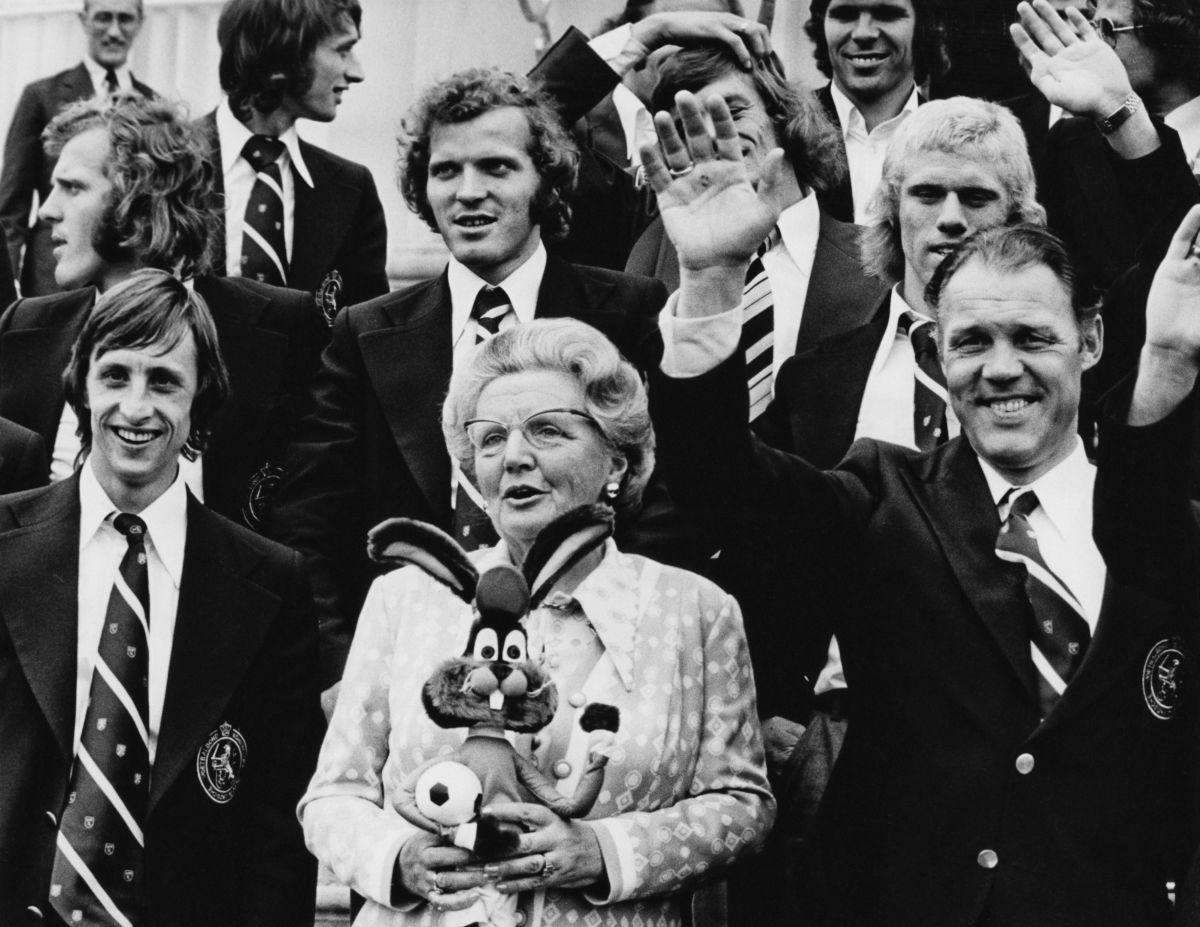
The most remarkable thing about Rinus is that he was able to happily marry all of these things into one cohesive style. The fact that the above quote could apply to both Guardiola and Mourinho, the two greatest (and greatly contrasting) coaches of this decade, is a testament to this feat.
It is also testament to his influence that we have still yet to talk about his teams, and how he succeeded with them. Because from lifting the Eredivisie four times, to the European Cup, to the European Championship, there was a heck of a lot of it.
To play in a Rinus Michels side you had to be two things: unbelievably fit and unmitigatedly adaptable. Essentially, you had to be a generational talent, with an ego small enough to bend to a maniacal manager's bidding.
And, fortunately enough, once he was established following early spells at JOS and DWS, Michels was not short of those, though considering Ajax's trajectory from relegation stragglers to champions, the causality was pretty clear - Michels moulded his players, not the other way around.
Johan Cruyff 14(Los Angeles Aztecs) and Rinus Michels(head coach of Los Angeles Aztecs) Washington Diplomats1-2Los Angeles Aztecs
— tphoto (@tphoto2005) November 28, 2018
at RFK Stadium in WashingtonDC, USA, on Sunday, 27 July 1979
Photo by Masahide Tomikoshi / TOMIKOSHI PHOTOGRAPHY pic.twitter.com/t9YrmN8pEO
And, from Johan Neeskens, his arch presser, to Velibor Vasovic, his libero in defence, to Arie Haan, the artful midfielder who was just as good at filling at centre back as he was carving up defences himself, the Dutch master crafted some masterful footballers.
"He put the Netherlands on the map in such a way that everybody still benefits from it. With him, results came first, but quality of soccer was No. 1. I will miss Rinus Michels." - Johan Cruyff
That is all without mentioning the Daddy of them all. The only man who could lay claim to shaping European football as much as Michels himself, Johan Cruyff.
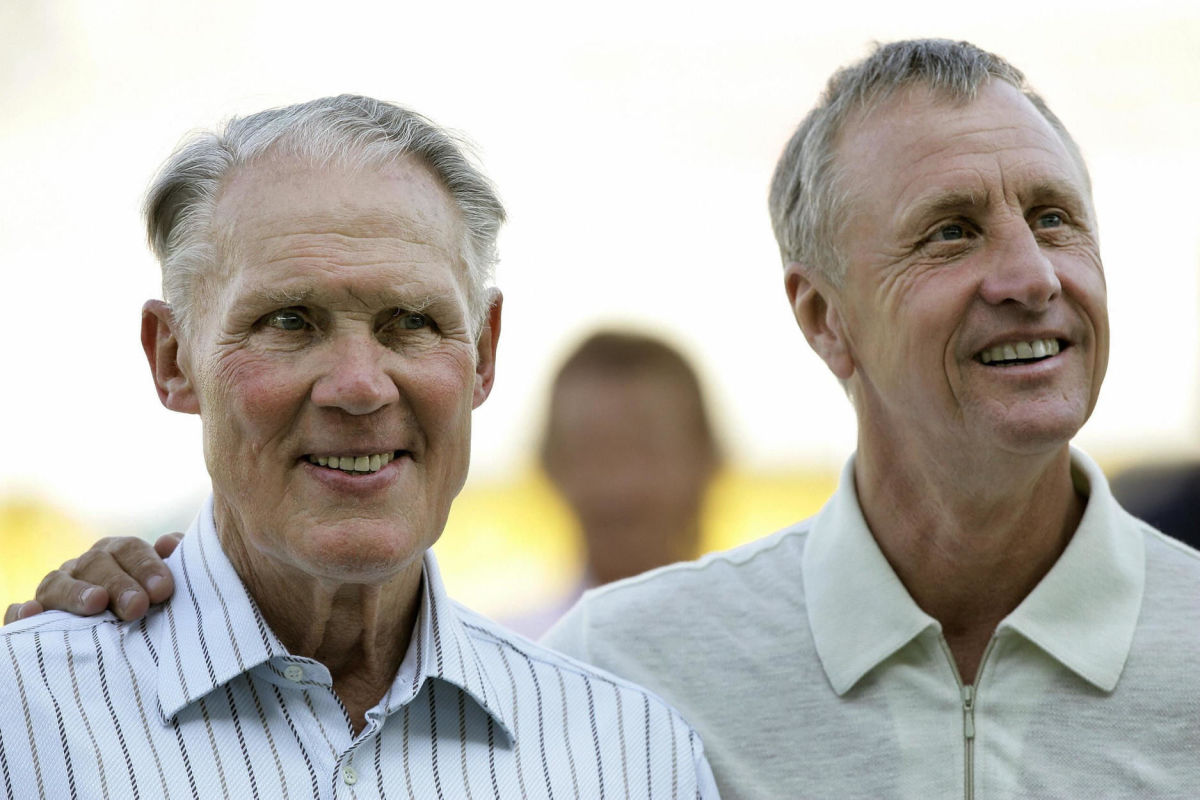
In Cruyff, Michels had the greatest player of his generation, but he was far from a just a Cruyff-turning luxury. Whether it was when they were together at Ajax, Barcelona, LA Aztecs or the national team, the Dutchman was charged with dropping off and interchanging just as much as his teammates were, though some allowances were made in order for him to float into those spaces that others couldn't.
With this model, Holland was subjugated for four out of the last five years of the 1960s, before the whole of Europe was conquered in 1971 with the lifting of the famous Big-Eared trophy. Spain was next, in 1974, before it was time for the world to submit to his methods.
Career Honours
Eredivisie (1966, 1967, 1968, 1970) |
|---|
KNVB Cup (1967, 1970, 1971) |
European Cup (1971) |
La Liga (1974) |
Copa Del Rey (1978) |
DFB Pokal (1983) |
European Championships (1988) |
For it was at the 1974 World Cup where the term 'Total Football' was first coined, when Cruyff cemented his legacy, and when the Oranje stunned all-but West Germany into submission.
Ultimately, they were undone by a mixture of vigorous man-marking, a flooded midfield and their own arrogance, but these faults were rectified 14 years later, with a different generation at the European Championships.
With Marco van Basten and Ruud Gullit sharing the 'Cruyff' role to some extent, and scoring some of the best goals ever seen, this time the Netherlands were able to overpower their opposition with the formidable presences of Ronald Koeman, Frank Rijkaard and Jan Wouters.
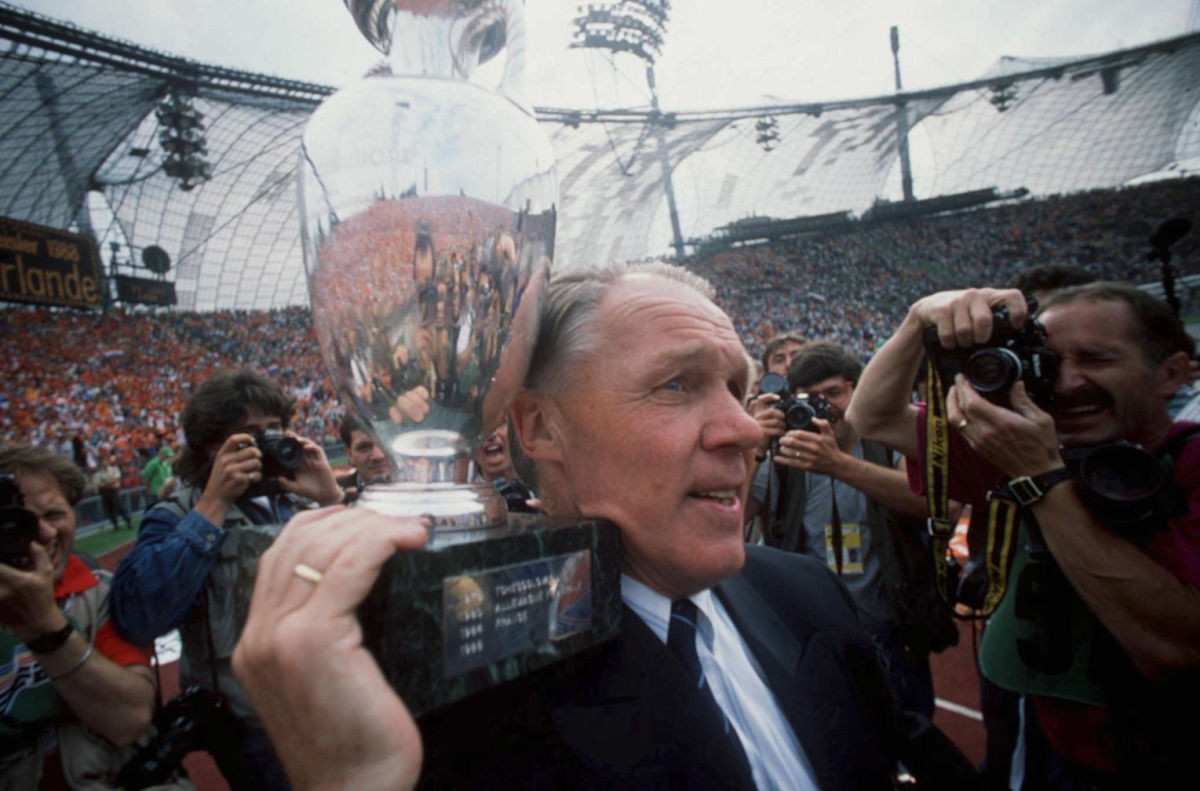
That triumph would ultimately earn him the title of 'The Father of Dutch Football', as put by Van Basten upon learning of his death in 2005, yet, as mentioned, his greatest legacy is the one that sprawled itself into all four corners of the footballing world.
"The only team I've seen that did things differently was Holland at the 1974 World Cup in Germany. Since then everything looks more or less the same to me ... Their 'carousel' style of play was amazing to watch and marvellous for the game." - Carlos Alberto
It's not just Barca's world-renowned La Masia academy that has been founded upon his beliefs, nor just the Netherlands who still adhere to his philosophies. Almost every youth-setup in the world borrows from his extensive development techniques, every *insert Premier League club* way based on his aesthetics.
So the Dutch Father is insufficient. No, Rinus Michels is the Father of Modern Football as we know it. It is, in fact, he who is Daddy of them all.
Number 50: Marcelo Bielsa - El Loco's Journey From Argentina to Footballing Immortality in Europe
Number 49: Vic Buckingham - How an Englishman Discovered Johan Cruyff & Pioneered Total Football
Number 48: Claudio Ranieri: A Ridiculed Tinkerman Who Masterminded One of Football's Greatest Ever Achievements
Number 47: Bill Nicholson: Mr Tottenham Hotspur, the First Double Winning Manager of the 20th Century
Number 46: Sven-Goran Eriksson: The Scudetto Winning Shagger Who Never Solved the Lampard-Gerrard Conundrum
Number 45: Sir Alf Ramsey: The Man Behind the 'Wingless Wonders' & England's Sole World Cup Triumph
Number 44: Antonio Conte: An Astute Tactician Whose Perfectionist Philosophy Reinvented the 3-5-2 Wheel
Number 43: Kenny Dalglish: The Beacon of Light in Liverpool's Darkest Hour
Number 42: Massimiliano Allegri: The Masterful Tactician Who Won Serie A Five Times in a Row
Number 41: Sir Bobby Robson: A Footballing Colossus Whose Fighting Spirit Ensured an Immortal Legacy
Number 40: Luis Aragones: Spain's Most Important Manager, the Atleti Rock and the Modern Father of Tiki-Taka
Number 39: Herbert Chapman: One of Football's Great Innovators & Mastermind Behind the 'W-M' Formation
Number 38: Carlos Alberto Parreira: The International Specialist Who Never Shied Away From a Challenge
Number 37: Franz Beckenbauer: The German Giant Whose Playing Career Overshadowed His Managerial Genius
Number 36: Viktor Maslov: Soviet Pioneer of the 4-4-2 & the Innovator of Pressing
Number 35: Rafa Benitez: The Conquerer of La Liga Who Masterminded That Comeback in Istanbul
Number 34: Zinedine Zidane: Cataloguing the Frenchman's Transition From Midfield Magician to Managerial Maestro
Number 33: Luiz Felipe Scolari: How the Enigmatic 'Big Phil' Succeeded as Much as He Failed on the Big Stage
Number 32: Jupp Heynckes: The Legendary Manager Who Masterminded 'the Greatest Bayern Side Ever'
Number 31: Vicente del Bosque: The Unluckiest Manager in the World Who Led Spain to Immortality
Number 30: Arsene Wenger: A Pioneering Who Became Invincible at Arsenal
Number 29: Udo Lattek: The Bundesliga Icon Who Shattered European Records
Number 28: Jock Stein: The Man Who Guided Celtic to Historic Heights & Mentored Sir Alex Ferguson
Number 27: Vittorio Pozzo: Metodo, Mussolini, Meazza & the Difficult Memory of a Two-Time World Cup Winner
Number 26: Jurgen Klopp: The Early Years at Mainz 05 Where He Sealed His 'Greatest Achievement'
Number 25:Mario Zagallo: Habitual World Cup Winner & Sculptor of Brazil's Joga Bonito Era
Number 24: Bela Guttmann: The Dance Instructor Who Changed Football Forever (and Managed...Just Everyone)
Number 23: Valeriy Lobanovskyi: The Scientist Who Dominated Football in the Soviet Union
Number 22: Louis van Gaal: The Stubborn Master Who Won 15 Major Trophies at 4 of the World's Greatest Clubs
Number 21: Otto Rehhagel: The 'King' Who Turned 150/1 Greek Outsiders into Champions of Europe
Number 20: Tele Santana: The 'Joga Bonito' Icon Who Helped Brazil Rediscover Their Love of Football
Number 19: Bill Shankly: The Innovative Motivator Who Rebuilt Liverpool From the Ground Up
Number 18: Ottmar Hitzfeld: The Manager Who Won Absolutely Everything at Germany's 2 Biggest Clubs
Number 17: Miguel Muñoz: The Man Who Told Alfredo Di Stefano to F*ck Off & Led the Ye-Ye's to European Glory
Number 16: Fabio Capello: Italy's Cosmopolitan Disciplinarian Who Built on a Generation-Defining AC Milan
Number 15: Brian Clough: He Wasn't the Best Manager in the Business, But He Was in the Top 1
Number 14: Nereo Rocco: 'El Paron', the Pioneer of Catenaccio & Forgotten Great of Italian Football
Number 13: Carlo Ancelotti: Football's Most Loveable Eyebrow in the Words of His Players
Number 12: Sir Matt Busby: The Man Who Built the Modern Manchester United
Number 11: Marcello Lippi: Montecristo Cigars, Neapolitan Dreams, Scudetti in Turin & Gli Azzurri's World Cup
Number 10: Bob Paisley: The Understated Tactician Who Conquered All of Europe With Liverpool
Number 9: Jose Mourinho: The 'Special One' Who Shattered Records All Over Europe
Number 8: Helenio Herrera: The Innovator Who Single-Handedly Changed the Beautiful Game
Number 7: Ernst Happel: The 'Weird Man' Who Conquered European Football and Helped Shape the Modern Game
Number 6: Johan Cruyff: The Visionary Who Became the Most Important Man in the History of Football
Number 5: Giovanni Trapattoni: A Career of 2 Halves That Defined the Golden Era of Calcio at Juventus
Number 4: Pep Guardiola: The Maverick Who Strolled to League Titles in Spain, Germany and England
